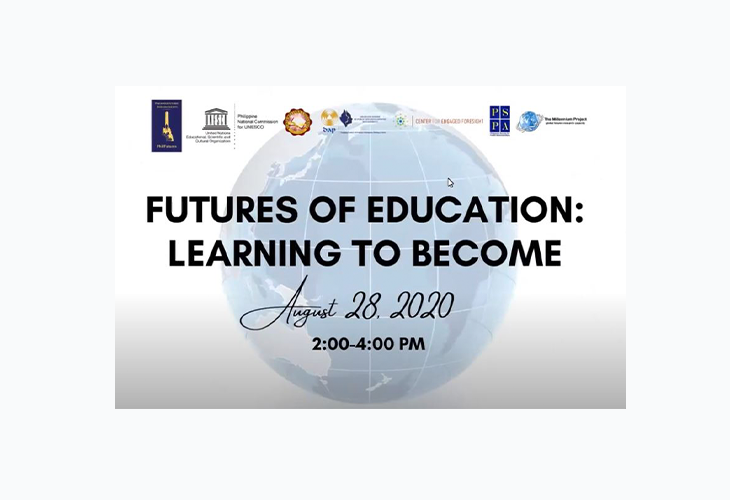Philippine perspectives on futures thinking and anticipatory systems introduced into futures of education initiative

On 28 August 2020, the Philippine Futures Thinking Society (PhilFutures), in cooperation with the Philippine National Commission for UNESCO (PH NatCom), Northwestern University, Center for Engaged Foresight, Philippine Society for Public Administration, Millennium Project, DAP Graduate School of Public and Development Management, officially launched the kick-off session of the online series of futures literacy and anticipatory conversations entitled, "Futures of Education: Learning to Become.”
This interagency collaboration was conceptualized to support UNESCO's global call to rethink the futures of education and to provide a platform for 'polylogue' among experts, thought leaders, young people, educators, civil society, governments, businesses, and other stakeholders.
PH NatCom OIC Usec. Ernesto C. Abella, who served as the keynote speaker, proposed that this 'polylogue' was a good start for engaging in global conversations that situate the futures of education in the Philippine context, especially now that we are facing a global health crisis. He expressed his hope that the post-COVID era would unleash innovation and new ways of thinking to mitigate the disruption in the education sector and to develop skills and competencies for both young and adult people.
Dr. Riel Miller, Head of Futures Literacy in UNESCO Headquarters, highlighted his vision of the futures of education by encouraging everyone to think beyond the challenges in education and to experiment using our intergenerational experiences to create a sustainable, resilient, and diversified world. He further mentioned that the futures of education is not about controlling tomorrow, but more of building a community that creates our shared values.
Meanwhile, Secretary Leonor “Liling” Briones of the Department of Education (DepEd) provided a comprehensive update on the status of our basic education in the recent years and in the time of pandemic. She cited that the challenges confronting the Philippine education system have made us so engrossed in the present, that the time we wanted to spend in the future has been threatened and competed. She added, however, that the Philippine government has been actively working to improve the education sector, including the support to futures literacy programs in the country. In fact, DepEd has already set up a Futures Thinking Group in partnership with relevant government agencies.
Prof. Shermon Cruz, Vice President of the PhilFutures, and Ms. Lindsay Barrientos, PH NatCom Deputy Executive Director, moderated the question and answer portion that followed the insightful and engaging discussions from the invited speakers. This engaged almost a thousand registered participants and viewers, with many heads and representatives of universities, colleges, and organizations participating in the discussion. When asked about their hopes about the futures of education in the Philippines, most agreed that the pandemic would help push the education sector to embrace the future of education, including the shift to online and distance education.
A recording of the webinar is available here: